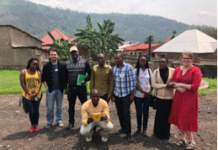By: Emmy Goering
Over the past nine years, Nigeria has faced repeated horrors as the militant Islamic terrorist organization, Boko Haram, wreaked havoc on the Northeast region. The organization, whose name literally translates to “Western education is forbidden,” regularly kidnaps innocent victims to join their cause. Girls and young women are taken as wives, forced to birth the next generation of terrorists. Boys and young men become unwilling soldiers. Anyone in Boko Haram’s path can fall victim to their machetes.
The terrorist organization became even more emboldened in their efforts in 2014 when they abducted a group of 276 schoolgirls in Chibok, Nigeria. International outcry over this mass kidnapping increased awareness, but the Boko Haram attacks continue. As of February 26th, 2018, 110 more girls were confirmed missing after a raid from a school in Yobe state. These large-scale events captured the eye of international news agencies as well as hearts around the globe. However, Boko Haram continues to murder and kidnap thousands of people in the Northeast region of Nigeria on a daily basis.
Boko Haram not only terrorizes the citizens of the country but also affects their food security and way of life. They loot and burn houses as they advance across the countryside, burning crops and destroying farmland. People flee from their burning homes, resulting in many internally displaced persons (IDPs). As UNHCR describes, “Internally Displaced People (IDPs) have not crossed a border to find safety. Unlike refugees, they are on the run at home.” Widespread famine grips the country, killing many of the nation’s children. Humanitarian groups can’t enter the region due to the rampant violence, so outside assistance isn’t an option. According to Refugees International, ”930,000 Nigerians in need are located in hard-to-reach areas due to ongoing fighting and military restrictions on movements.”
Another crisis that Northeastern Nigeria faces includes a severe reduction in available healthcare service centers. According to the World Health Organization, “Millions of people in Borno state have had limited or no access to regular health services over a number of years, leading to very low vaccination rates.” Children are especially hard hit by the combined effects of these issues.
Although efforts are being made to assist, the number of Nigerians still in crisis is overwhelming. Refugees International reports, ”The scale of the humanitarian and security challenges within Nigeria remains staggering with more than 1.6 million Nigerians displaced within the country and 7.7 million in urgent need of emergency assistance.”








